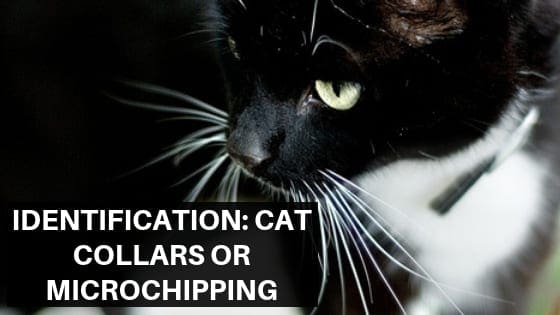
When it comes to identification for cats, you may not think it’s important if they never go outdoors. Actually, all cats should have some form of I.D. because the unthinkable could happen one day where your indoor kitty bolts out the door or is accidentally let outside.
Types of Identification for Cats
There are basically two ways of making sure your cat can be identified should she end up lost. The first is the traditional method of having an I.D. tag on a collar around the neck. The second is to have your cat microchipped.
Collars and Tags
The good part about this method is it’s easy for someone to visibly see the cat belongs to someone and that person can immediately call you if they’re able to get close enough to the cat to read the information on the tag.
There are a few downsides to relying on an identification tag and collar alone though. First, the collar has to actually be on the cat for it to be effective. If the collar hasn’t been fitted properly and your cat can easily use her paws to get it off, then it won’t do any good. The other problem is collars can get hung up on tree branches and bushes if your cat goes outdoors. The type of collars that are recommended are breakaway collars to prevent cats from getting strangled should they get hung up on a tree limb. That type of collar saves the cat’s life but it also then leaves the identification on the tree limb and not on the cat.
The other downside of using a collar and tag alone is if your cat is stolen, the collar can simply be removed.
Microchipping
A microchip is a small chip your veterinarian can insert just under your cat’s skin. The chip is typically inserted at the top of the back, just between the shoulder blades. Insertion of the chip is done with a special needle and the process is extremely fast. The chip itself is extremely small but contains important identification information.
The microchip inserted under your cat’s skin contains a number that a handheld scanner can read. All veterinarians and shelters have these scanners. When you have your cat microchipped, you then register your contact information as well as information about your cat with the registry company. You can update your contact information easily so the microchip is never outdated. If you move or change phone numbers, it’s crucial you keep the registry information current.
https://catbehaviorassociates.com/buy-pams-books/
Should You Choose an I.D. Tag or Microchipping?
This is an individual decision based on your cat’s risk factors and whether you’ve trained your kitty to accept wearing a collar. The collar is easy for people to see but since there’s a risk of it coming off (or taken off), the microchip is permanent. As long as you keep the information current with the registry company, you’ll always have proof the cat belongs to you.
Need More Information?
For information on cat behavior and training, refer to the best-selling books by Pam Johnson-Bennett. Pam’s books are available at bookstores and online. We’ve included links to Amazon here on our website.
 Problem Solving & Advice by Pam Johnson-Bennett Cat Behavior Expert & Best-selling Author
Problem Solving & Advice by Pam Johnson-Bennett Cat Behavior Expert & Best-selling Author




